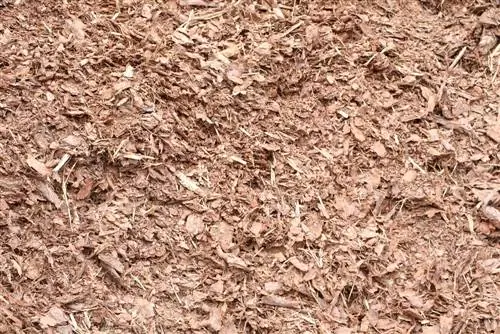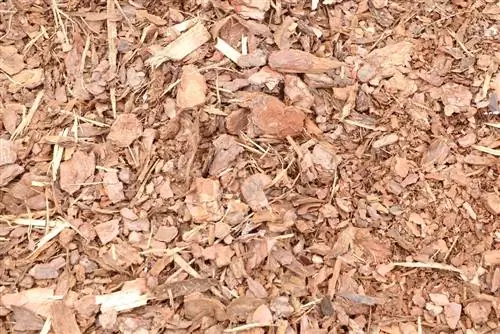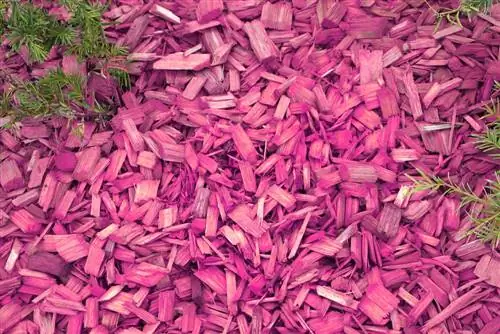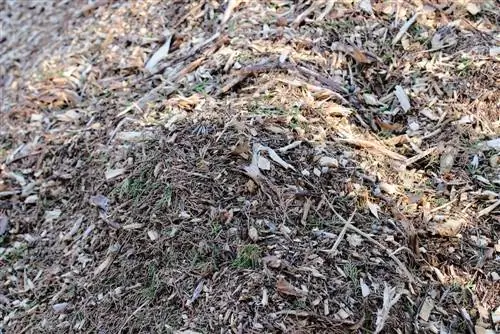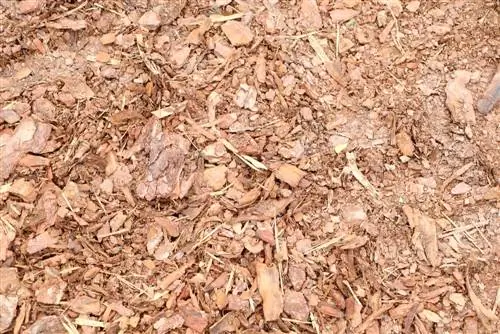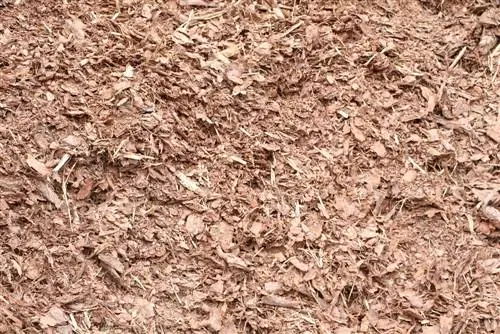- Author admin caroline@plants-knowledge.com.
- Public 2023-12-17 03:39.
- Last modified 2025-06-01 06:48.
Many gardeners practice covering the free soil area with bark mulch; after all, the process offers numerous advantages and reduces work in the bed to a minimum. However, the material is not always the best choice; some plants are even very sensitive to it. So that you don't have to miss out on the benefits of mulching, you can choose a more suitable alternative. We will introduce you to suitable candidates.
Why is mulching useful?
Bedges and beds can be mulched in many different ways. The primary purpose of covering the free ground is to prevent unwanted growth, such as weeds. This measure also serves to improve the soil and protects the exposed earth from drying out and erosion, for example due to rain and intense sunlight. If you use organic mulching material - which, in addition to bark mulch, also includes pine bark, wood chips and other substances - then you will also be supplying the soil with the necessary nutrients that were previously deprived of it by the plants. Inorganic materials such as gravel or gravel are also recommended as an easy-care alternative.
When should you not mulch?
However, mulching garden soil does not always make sense. It is better to avoid this measure if the soil in question often has to be worked intensively, for example
- to pull weeds
- to improve ventilation by hacking
- Highly nutrient-consuming plants should be fertilized regularly
- Remove foliage that is potentially infected with fungi
- hill up frost-sensitive plants with soil in autumn.
Mulching, especially with bark mulch, only complicates such maintenance work unnecessarily and should therefore be avoided.
Tip:
Above all, noble roses often suffer from any lack of soil coverage, which is reflected, among other things, in a lack of flowering, yellow leaves and fungal diseases such as sooty mold. If at all, only mulch roses with compost or cover the ground with suitable, low-growing and low-consuming perennials. Cranesbill (Geranium) is particularly suitable.
Bark mulch - pros and cons
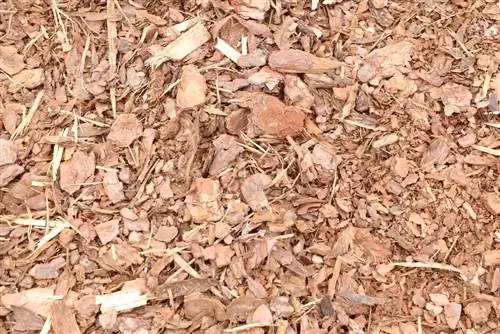
Bark mulch is a waste product from forestry because it is chopped tree bark. This remains after the trees are peeled down for wood processing, is shredded into different grain sizes and finally sold as natural mulch material for the home garden. As a rule, the chopped bark consists of the bark of native spruce or pine trees, with pine bark being particularly popular in horticulture: it suppresses weeds better than other varieties. However, the often used material has many advantages as well as some disadvantages, especially since shredded bark is not a good choice for every soil and for all types of plants. It is therefore important to carefully weigh up the pros and cons and, if necessary, look for an alternative.
Advantages
A covering of shredded bark protects the bare soil in the bed in a variety of ways:
- no strong heating when exposed to sunlight - roots stay cool
- low evaporation - moisture remains in the soil
- Protection against weather influences and therefore against erosion
- Protection from winter frost
- high content of tannic acid - growth inhibiting, fewer weeds
- Soil activation - rots into humus and provides nutrients
Tip:
You determine the rate of rotting yourself by choosing a finer or coarser grain size of the material. The coarser the pieces of bark, the slower they break down.
Disadvantages
However, some of the advantages of bark mulch can also be explained as a disadvantage:
- High tannic acid content: not only prevents weeds, but especially young plants from growing
- Soil activation: The rotting process removes nutrients from the soil, especially nitrogen
- Acidification of the soil: shredded bark is particularly suitable for acid-loving plants
- unsuitable for rock garden and prairie plants, roses, many bedding plants, Mediterranean herbs
- good hiding places for snails and other pests
Tip:
Enrich the soil with horn shavings or meal before mulching to prevent nitrogen deficiency.
The 9 best alternatives
This list provides you with some good alternatives to the ubiquitous bark mulch. Depending on the soil composition, plants and garden style, different coverings come into question - after all, not every material is suitable for every purpose.
Pine bark
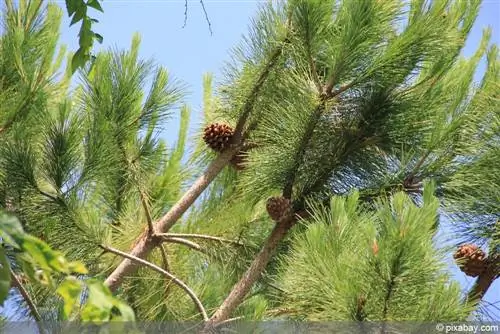
Pine bark is basically the same as shredded bark from local tree material, but contains the natural bark of pine trees from the Mediterranean region. Pine mulch naturally has a strong red to orange tint and smells pleasant but not overpowering of conifers. Another advantage is the slow decay: While chopped bark from local wood has to be replaced every two to three years at the latest, pine bark decomposes much more slowly. Of course, the material also has disadvantages: Not only is it comparatively expensive, it also has the same disadvantages as pine or spruce bark mulch. Only the proportion of pollutants is usually lower.
Wood chips
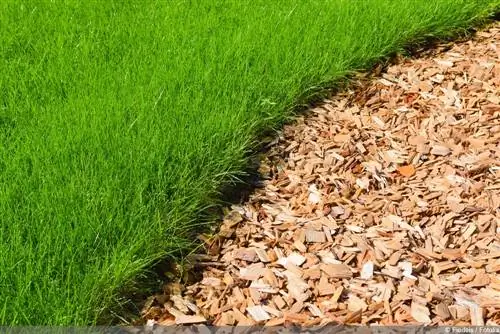
Wood chips also come from the timber industry. However, not only the tree bark, but also entire wood waste is finely shredded. Wood chip mulch has a very long shelf life - significantly longer than two to three years - it also has good permeability to air and water, is low in dust and warms the ground in winter. However, the material also promotes fungal growth, which is why you should be careful when spreading it over large areas - constant moisture not only leads to mold, but also hat fungi.
Lavalit / lava mulch
This is a natural, non-rotting and odor-free material that can be used preferably for perennial and flower beds. Lava mulch does not add any nutrients to the soil, but does not remove any nutrients due to the lack of rotting process. In addition to all the other advantages typical of mulch, lava mulch also offers another: The rock heats up through winter sunlight and releases this heat into the ground, so that it practically serves as a natural frost protection for cold-sensitive plants. In summer, lava mulch keeps the sun away from the earth and thus prevents overheating.
Natural stone mulch
Gravel or gravel are also very suitable for mulching, but you should only use both for rock gardens orUse gravel garden plants. In particular, regular fertilization is made more difficult by mulching with stones, as these would have to be removed before supply.
Miscanthus
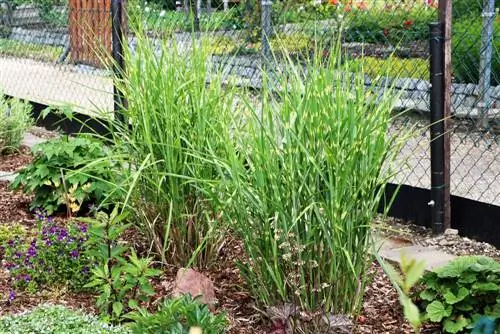
This is the chopped Chinese reed clippings, which can also be used excellently for mulching. In contrast to bark mulch, miscanthus shreds are pH and odor-neutral and therefore represent a good alternative for plants that rely on neutral to alkaline soil. However, the shreds have one disadvantage: they are fine and very light, which is why you should only bring them to the bed when they are well moistened.
Underplanting with ground cover plants
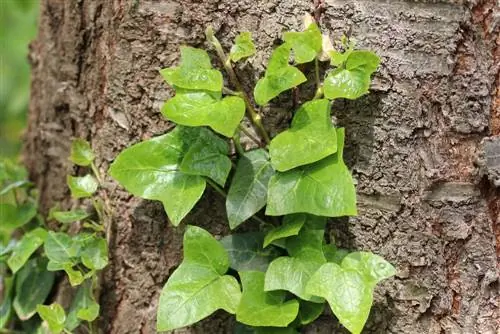
You can also plant low, partly evergreen ground cover plants between perennials and shrubs and under trees and cover the area in this way. Of course, the effort in the first three to four years is significantly higher than with other mulching options, but in return you have a natural cover and a more lively garden. For example,are particularly suitable for this purpose.
- Storksbill (Geranium)
- Waldsteinia (Waldsteinia)
- Fairy Flower (Epimedium)
- Small periwinkle (Vinca minor)
- Creeping medlar (Cotoneaster radicans)
- Ivy (Hedera helix)
Leaves
What could be better than mulching the garden with natural materials such as leaves? The leaves of deciduous trees that fall in autumn are ideal for this purpose and are also available completely free of charge. Over the course of the year, the mulch rots and releases many valuable nutrients, but it is only short-lived and not particularly good to look at. However, only use the leaves of he althy trees to avoid introducing fungal diseases into your borders and beds.
Compost
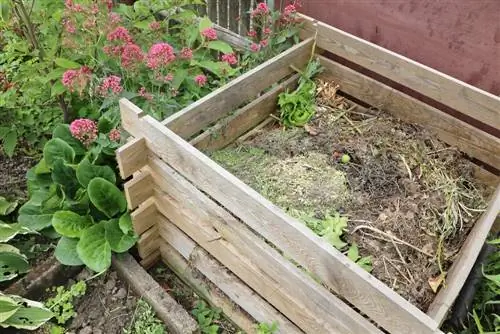
Coarse compost is also a wonderful mulching material and is particularly suitable for the natural garden. However, it can only be used for heavy-feeding plants, and the material is not effective against weeds - on the contrary: anyone who also composts their (root) weeds will experience many a nasty surprise.
Lawn cutting
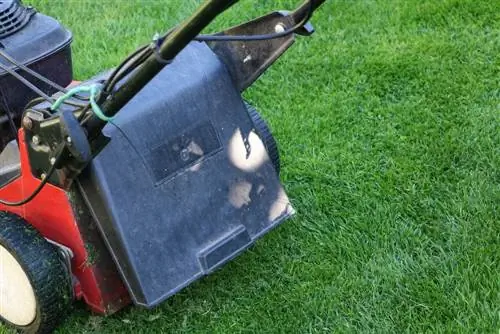
If you have a large lawn in your garden and mow it regularly, the question arises: what to do with all the grass clippings? Of course you can compost it, but the material is also suitable for mulching - and together with compost makes an excellent fertilizer.

